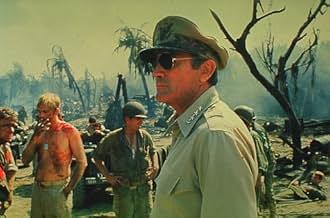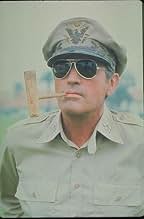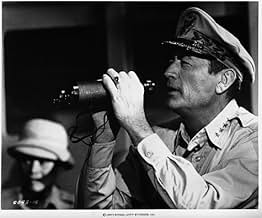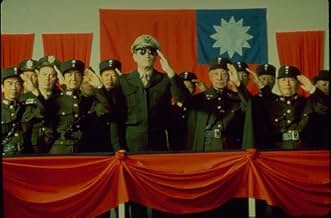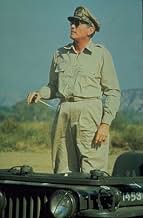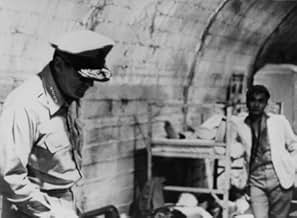IMDb RATING
6.5/10
5.5K
YOUR RATING
Biopic of General Douglas MacArthur covering his war exploits during WW2 and the Korean War.Biopic of General Douglas MacArthur covering his war exploits during WW2 and the Korean War.Biopic of General Douglas MacArthur covering his war exploits during WW2 and the Korean War.
- Awards
- 2 nominations total
Russell Johnson
- Admiral King
- (as Russell D. Johnson)
- Director
- Writers
- All cast & crew
- Production, box office & more at IMDbPro
Featured reviews
Unlike Patton, Pershing, Grant or Eisenhower, MacArthur is a many sided character and Peck played the part as I believe MacArthur really was. The positive PR version produced by the U.S. Army in the l940's or the negative liberal press version of the l950's are very limited in their understanding of this great man. I have always believed that MacArthur was a turn of the century progressive much like Teddy Roosevelt, at the same time both imperial and caring, who lived past his time into the l960's. His tactical decisions were unmatched by any general in our history. His speeches rival those of William Jennings Bryan or Patrick Henry and I'm sure many wish we could send him and his administrative skills to Iraq to put that mess back together. In the years since his death a small cult has grown up around his memory much like Robert E.Lee and to some his words are almost mystical. He was a major player in one way or another in WWI, the depression, WWII, Korea and if you count his death-bed plea to President Johnson to get our troops out of Vietnam, even the Vietnam War. If you want to stretch things even farther, he can be tied to turn of the century imperialism and the Spanish-American War through his part in the Philippine Insurrection following the Spanish-American War and if you must, the Indian Wars which he experienced as a small boy with his parents. He has been described as a conservative, a liberal, a militant and a pacifist. How could one man be so much a part of the 19th century and believe in war only between individuals(like Custer and Crazy Horse) or as in feudal times yet advocate A-bombing China? He is always described as arrogant and overly dramatic but like Grant he wore a simple 2nd Lieutenant's uniform with five stars on the shoulder minus all the medals that the "G.I. generals" wore. I believe his love for the people of Asia was sincere and in this was he was like Alexander or Caesar. We are fortunate Gregory Peck did play MacArthur as such a complex individual. To focus only on the Five-Star General with the corn-cob pipe is to miss the the big picture. No wonder Patton is so easy to watch compared to MacArthur. I have seen the movie at least 15 times and am still moved by it.
Nice biographic film about controversial as well as flamboyant General masterfully played by Gregory Peck and who was Chief of Staff of the United States Army during the 1930s to 1940s and played a prominent role in the Pacific theater during World War II , having received the Medal of Honor for his service in the Philippines Campaign .
Agreeable biopic about the famed general concerning the latter years of his long military career , it starts with his assumption of command of the Philippine army and subsequent retreat ; going on through Inchon landing , China invasion on Korea crossing over parallel 39 and his sacking by President Harry Truman . This is a pretty good film with plenty of emotion , drama , biographic elements , historical events and Peck is spellbinding in the title role . The flick describes efficiently his particular character , complexity and the controversy that surrounded him . Very fine acting by the great Gregory Peck as military chief , he even bears remarkable resemblance to Douglas MacArthur , he had some of his hair shaved off since the real General was quite bald . Peck' outstanding acting arranges to bring alive this historical role , who strode a fine line between demigod and expert battlefield commander . Originally made for TV , it has a long runtime , at 144 minutes , being cut for cinema release . The picture gets magnificent interpretations from prestigious secondaries playing Generals and historical roles such as Kenneth Tobey (Adm. William 'Bull' Halsey) , Gen. George C. Marshall (Ward Costello) , Addison Powell (Fleet Adm. Chester W. Nimitz) , Dick O'Neill (Col. Courtney Whitney) , and Presidents as Dan O'Herlihy (Franklin D Roosevel) , Ed Flanders (Harry Truman) , and John Fujioka (Emperor Hirohito) . This is an engaging warlike drama made at the better for its historic resonance and will appeal to Gregory Peck fans.
Well produced by Frank McCarthy who also financed other warfare movies such as ¨Decision before dawn¨, ¨Single-Handed¨, ¨Fireball Forward¨ and ¨Patton¨ . This solid motion picture was professionally directed by Joseph Sargent , though it holds a certain television style . Sargent is an expert on biography and specialist on historical narrations , as he proved in 'Mandela and Clerk' , 'Abraham , 'McArthur' , 'When the lions roared' which reunited to Stalin , Churchill and again Roosevelt , 'Day one' with Oppenheimer and General General Groves and 'Warm Springs' about Franklin D Roosevelt ; these films don't pack the punch that he achieved in his best movie resulting to be 'Taking of Pelham one , two , three' .
And adding more biographical elements about this military hero : MacArthur was recalled to active duty in 1941 as commander of United States Army Forces in the Far East. A series of disasters followed, starting with the destruction of his air forces on 8 December 1941, and the invasion of the Philippines by the Japanese. MacArthur's forces were soon compelled to withdraw to Bataan, where they held out until May 1942. In March 1942, MacArthur, his family and his staff left nearby Corregidor Island in PT boats and escaped to Australia, where MacArthur became Supreme Commander, Southwest Pacific Area. And General Douglas MacArthur pronounces his famous line : "I will return" . For his defense of the Philippines, MacArthur was awarded the Medal of Honor. After more than two years of fighting in the Pacific, he fulfilled a promise to return to the Philippines. He officially accepted Japan's surrender on 2 September 1945, aboard the USS Missouri anchored in Tokyo Bay, and oversaw the occupation of Japan from 1945 to 1951. As the effective ruler of Japan, he oversaw sweeping economic, political and social changes. He led the United Nations Command in the Korean War until he was removed from command by President Harry S. Truman on 11 April 1951. He later became Chairman of the Board of Remington Rand.
Agreeable biopic about the famed general concerning the latter years of his long military career , it starts with his assumption of command of the Philippine army and subsequent retreat ; going on through Inchon landing , China invasion on Korea crossing over parallel 39 and his sacking by President Harry Truman . This is a pretty good film with plenty of emotion , drama , biographic elements , historical events and Peck is spellbinding in the title role . The flick describes efficiently his particular character , complexity and the controversy that surrounded him . Very fine acting by the great Gregory Peck as military chief , he even bears remarkable resemblance to Douglas MacArthur , he had some of his hair shaved off since the real General was quite bald . Peck' outstanding acting arranges to bring alive this historical role , who strode a fine line between demigod and expert battlefield commander . Originally made for TV , it has a long runtime , at 144 minutes , being cut for cinema release . The picture gets magnificent interpretations from prestigious secondaries playing Generals and historical roles such as Kenneth Tobey (Adm. William 'Bull' Halsey) , Gen. George C. Marshall (Ward Costello) , Addison Powell (Fleet Adm. Chester W. Nimitz) , Dick O'Neill (Col. Courtney Whitney) , and Presidents as Dan O'Herlihy (Franklin D Roosevel) , Ed Flanders (Harry Truman) , and John Fujioka (Emperor Hirohito) . This is an engaging warlike drama made at the better for its historic resonance and will appeal to Gregory Peck fans.
Well produced by Frank McCarthy who also financed other warfare movies such as ¨Decision before dawn¨, ¨Single-Handed¨, ¨Fireball Forward¨ and ¨Patton¨ . This solid motion picture was professionally directed by Joseph Sargent , though it holds a certain television style . Sargent is an expert on biography and specialist on historical narrations , as he proved in 'Mandela and Clerk' , 'Abraham , 'McArthur' , 'When the lions roared' which reunited to Stalin , Churchill and again Roosevelt , 'Day one' with Oppenheimer and General General Groves and 'Warm Springs' about Franklin D Roosevelt ; these films don't pack the punch that he achieved in his best movie resulting to be 'Taking of Pelham one , two , three' .
And adding more biographical elements about this military hero : MacArthur was recalled to active duty in 1941 as commander of United States Army Forces in the Far East. A series of disasters followed, starting with the destruction of his air forces on 8 December 1941, and the invasion of the Philippines by the Japanese. MacArthur's forces were soon compelled to withdraw to Bataan, where they held out until May 1942. In March 1942, MacArthur, his family and his staff left nearby Corregidor Island in PT boats and escaped to Australia, where MacArthur became Supreme Commander, Southwest Pacific Area. And General Douglas MacArthur pronounces his famous line : "I will return" . For his defense of the Philippines, MacArthur was awarded the Medal of Honor. After more than two years of fighting in the Pacific, he fulfilled a promise to return to the Philippines. He officially accepted Japan's surrender on 2 September 1945, aboard the USS Missouri anchored in Tokyo Bay, and oversaw the occupation of Japan from 1945 to 1951. As the effective ruler of Japan, he oversaw sweeping economic, political and social changes. He led the United Nations Command in the Korean War until he was removed from command by President Harry S. Truman on 11 April 1951. He later became Chairman of the Board of Remington Rand.
History buffs will find plenty to quibble with in "MacArthur." Like a lot of World War II movies, it has its share of minor errors. And American military enthusiasts are certain to have strong opinions on Douglas MacArthur already, which will affect their views of the film.
But all in all, I think this is a remarkably balanced look at an extremely controversial person. For those who know little about MacArthur, it's a good place to start. He was a larger-than-life figure, and in this film you can see both why he was revered and why he was despised.
Although MacArthur came of age in the 19th century and became a general in World War I, this movie focuses on his high and lows in World War II and the Korean War. During that time he was an iconic figure. "Iconic" is an overused word, but it applies to him. With his trademark hat and corncob pipe, plus his curiously old-fashioned way of speaking and his instinct for controversy, he was unmistakable and larger than life.
During the late 1970s, the post-Watergate era, traditional war pictures were no longer in vogue. "M*A*S*H," the mildly pacifist TV series set in the Korean War, treated MacArthur as a rather silly figure. But this movie, made in 1977, takes the man seriously, while showing his flaws clearly. It also is more frank than most classic films about how little consensus there is in warmaking. Leaders quarrel and connive while making policy, and the most loyal grunts are often dismayed at the decisions that put them in harm's way.
Gregory Peck is excellent in capturing the complexity of Douglas MacArthur. Peck was an outspoken political liberal, and one has to assume he was no admirer of the unabashedly right-wing MacArthur. But he takes on the man's persona admirably.
After heaping so much praise on "MacArthur," I must admit it is not great cinema. It's more interesting than moving. But if you're under 50 and know Douglas MacArthur only as a name in the history books, this will be an eye-opener. Like any good introduction to a subject, it should encourage you to seek other information and form your own opinions about the man and his times.
But all in all, I think this is a remarkably balanced look at an extremely controversial person. For those who know little about MacArthur, it's a good place to start. He was a larger-than-life figure, and in this film you can see both why he was revered and why he was despised.
Although MacArthur came of age in the 19th century and became a general in World War I, this movie focuses on his high and lows in World War II and the Korean War. During that time he was an iconic figure. "Iconic" is an overused word, but it applies to him. With his trademark hat and corncob pipe, plus his curiously old-fashioned way of speaking and his instinct for controversy, he was unmistakable and larger than life.
During the late 1970s, the post-Watergate era, traditional war pictures were no longer in vogue. "M*A*S*H," the mildly pacifist TV series set in the Korean War, treated MacArthur as a rather silly figure. But this movie, made in 1977, takes the man seriously, while showing his flaws clearly. It also is more frank than most classic films about how little consensus there is in warmaking. Leaders quarrel and connive while making policy, and the most loyal grunts are often dismayed at the decisions that put them in harm's way.
Gregory Peck is excellent in capturing the complexity of Douglas MacArthur. Peck was an outspoken political liberal, and one has to assume he was no admirer of the unabashedly right-wing MacArthur. But he takes on the man's persona admirably.
After heaping so much praise on "MacArthur," I must admit it is not great cinema. It's more interesting than moving. But if you're under 50 and know Douglas MacArthur only as a name in the history books, this will be an eye-opener. Like any good introduction to a subject, it should encourage you to seek other information and form your own opinions about the man and his times.
No matter what you have to say about MacArthur, critical or otherwise, he shaped events in the Pacific theater of World War II to give him a part of history in the twentieth century. In this well done production with Gregory Peck in the leading role, he gives a candid performance of the flamboyant and publicity seeking authoritative General who turned earlier defeat into ultimate victory. His great speech on arrival from the Phillipines, by train at Spencer Street Station in Melbourne Australia in March 1942 incorporating those famous words - " I came through and I shall return" - was an inspiration to many Australians during their darkest hour.
From the time of his arrival in our country he quickly abandoned the idea of defending any mainland invasion by the Japanese and decided on an offensive in New Guinea as a counter attack. Peck is perfect in the role of the self minded MacArthur doggedly pursuing the Japanese back to their homeland while arguing with his own superiors, including U.S. President Franklin D. Roosevelt over his earlier promise to liberate the Phillipines, which was planned to be bypassed. After the Japanese surrender, MacArthur becomes virtual ruler of Japan modifying old customs and instituting sweeping land reforms. His authority remained absolute until the outbreak of the Korean War in 1950, when he clashed with new U.S. President Harry Truman over his successful campaign against the North Koreans and his intention to take on their Communist Chinese backers. Truman, wanting to avoid another world conflict, relieves MacArthur of his command and he is recalled home. Peck is magnificent with his captivating speech before a band of West Point recruits where he details his life and closes the movie with that famous caption " Old soldiers never die - they just fade away". This movie is a must for the younger generation of this world, to know that today's freedom was the result of the sacrifices made by their forbears.
To add a final footnote my mother worked at Archerfield aerodrome in Brisbane in 1942 with her sister where they were employed as aircraft riveter's being responsible for the repair of the fuselage of damaged U.S. Aircraft used during the defense of our country during World War 2. She told me well before her death in March 2004 how she took her limited time off from work to travel to central Brisbane just to watch General MacArthur walk down Queen Street from his home base at Lennons Hotel to the AMP building in Edward Street where he had his headquarters.
She said what a fine figure he cut, tall and handsome, and full of confidence in his goal of supreme victory. Her expectations in the faith of this great American General were ultimately justified. We are a free country today for the contribution of his great military expertise in the time of our greatest need.
From the time of his arrival in our country he quickly abandoned the idea of defending any mainland invasion by the Japanese and decided on an offensive in New Guinea as a counter attack. Peck is perfect in the role of the self minded MacArthur doggedly pursuing the Japanese back to their homeland while arguing with his own superiors, including U.S. President Franklin D. Roosevelt over his earlier promise to liberate the Phillipines, which was planned to be bypassed. After the Japanese surrender, MacArthur becomes virtual ruler of Japan modifying old customs and instituting sweeping land reforms. His authority remained absolute until the outbreak of the Korean War in 1950, when he clashed with new U.S. President Harry Truman over his successful campaign against the North Koreans and his intention to take on their Communist Chinese backers. Truman, wanting to avoid another world conflict, relieves MacArthur of his command and he is recalled home. Peck is magnificent with his captivating speech before a band of West Point recruits where he details his life and closes the movie with that famous caption " Old soldiers never die - they just fade away". This movie is a must for the younger generation of this world, to know that today's freedom was the result of the sacrifices made by their forbears.
To add a final footnote my mother worked at Archerfield aerodrome in Brisbane in 1942 with her sister where they were employed as aircraft riveter's being responsible for the repair of the fuselage of damaged U.S. Aircraft used during the defense of our country during World War 2. She told me well before her death in March 2004 how she took her limited time off from work to travel to central Brisbane just to watch General MacArthur walk down Queen Street from his home base at Lennons Hotel to the AMP building in Edward Street where he had his headquarters.
She said what a fine figure he cut, tall and handsome, and full of confidence in his goal of supreme victory. Her expectations in the faith of this great American General were ultimately justified. We are a free country today for the contribution of his great military expertise in the time of our greatest need.
Like the Movies made about Jesus Christ, no one is going to Agree about its complete Accuracy or Decisions concerning the Time Period covered. It's virtually an Impossible Task to present a Total Conception and with Budget and Running Time Restrictions adding to the Limitations.
Most WWII Historians, Armchair or otherwise, tend to give Gregory Peck a nod and are Thankful that His Liberal Leanings did not Cloud His Judgement or Portrayal of the Dynamic and Controversial General.
It is Well Known that MacArthur was Hell Bent on Crafting an Image of Himself as Larger than Life. The Movie has a few Scenes where His Aides Instruct the Newsreel Cameraman to Film the General from a Low Angle, "He loves that technique.". He used Props (corncob pipe) to give Himself a Unique Flair and His Filmed Entrances are Legendary.
MacArthur was not only a Brilliant General, He was a Brilliant Man. His Eloquent way with Words, making His Arguments and displayed Insights with a Poetic Zeal. All of the Aforementioned is seen in this Even Handed Account, originally Made-for TV than Edited for a Theatrical Release.
The Film is Sweeping in Concept, if not in Presentation. It's somewhat Low-Budget renders a Flat Production, but it makes up for it with Peck's Command of the Role and an Appropriately Wordy Script.
Above Average and a Powerful Portrayal of just over a Decade in the Complicated and ever Interesting Leader who was much Loved by the American People, the Philippines, and Japan (for His compassionate and intelligent restructuring of the island's ashes).
President Truman did not Worship the General, as many did and the Movie ends with MacArthur Relieved by the Commander and Chief. It seems even the Accomplished Military Leader was Unable to "Walk On Water", and was Symbolically Crucified by the President.
Most WWII Historians, Armchair or otherwise, tend to give Gregory Peck a nod and are Thankful that His Liberal Leanings did not Cloud His Judgement or Portrayal of the Dynamic and Controversial General.
It is Well Known that MacArthur was Hell Bent on Crafting an Image of Himself as Larger than Life. The Movie has a few Scenes where His Aides Instruct the Newsreel Cameraman to Film the General from a Low Angle, "He loves that technique.". He used Props (corncob pipe) to give Himself a Unique Flair and His Filmed Entrances are Legendary.
MacArthur was not only a Brilliant General, He was a Brilliant Man. His Eloquent way with Words, making His Arguments and displayed Insights with a Poetic Zeal. All of the Aforementioned is seen in this Even Handed Account, originally Made-for TV than Edited for a Theatrical Release.
The Film is Sweeping in Concept, if not in Presentation. It's somewhat Low-Budget renders a Flat Production, but it makes up for it with Peck's Command of the Role and an Appropriately Wordy Script.
Above Average and a Powerful Portrayal of just over a Decade in the Complicated and ever Interesting Leader who was much Loved by the American People, the Philippines, and Japan (for His compassionate and intelligent restructuring of the island's ashes).
President Truman did not Worship the General, as many did and the Movie ends with MacArthur Relieved by the Commander and Chief. It seems even the Accomplished Military Leader was Unable to "Walk On Water", and was Symbolically Crucified by the President.
Did you know
- TriviaAlthough Gregory Peck had reservations about the film's script and production quality, he later called it one of his favorite roles, if not one of his favorite movies.
- GoofsShortly after MacArthur's escape from the Philippines in the spring of 1942, he complains that the President and the Chiefs of Staff are not sending him enough troops, supplies, and equipment to carry on his war against the Japanese. He says that priorities are instead being given to commanders in other theaters, including Gen Patton in North Africa. However, Patton's troops did not arrive in Africa until November 1942.
- Quotes
President Sergio Osmena: You see, General, my people are going to laugh if I fell in deep water. I cannot swim!
General Douglas MacArthur: That's not so bad, Mr. President. Everyone's about to see that I can't walk on water.
- Alternate versionsThe UK DVD issue omits the sequence where MacArthur meets Emperor Hirohito, but instead, adds to the ending. The film now ends with MacArthur and his wife watch a TV transmission of the presidential inauguration of Eisenhower MacArthur's comment: "He will turn out fine. He was the best clerk that ever served under me"), followed by the end of MacArthur's farewell speech at West Point. The subsequent credits starts to roll slightly earlier than previously.
- How long is MacArthur?Powered by Alexa
Details
- Release date
- Country of origin
- Language
- Also known as
- MacArthur - Held des Pazifik
- Filming locations
- Navy Yard, Bremerton, Washington, USA(scenes on USS Missouri)
- Production company
- See more company credits at IMDbPro
Box office
- Budget
- $9,000,000 (estimated)
- Runtime
- 2h 10m(130 min)
- Sound mix
- Aspect ratio
- 1.85 : 1
Contribute to this page
Suggest an edit or add missing content

